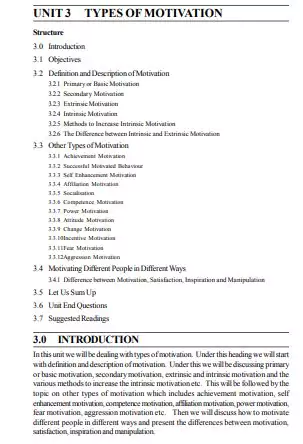‘What Is Motivation And Their Type’ PDF Quick download link is given at the bottom of this article. You can see the PDF demo, size of the PDF, page numbers, and direct download Free PDF of ‘types of motivation in psychology’ using the download button.
Intrinsic And Extrinsic Motivation PDF Free Download

Types of Motivation in Psychology
In this unit, we will be dealing with types of motivation. Under this heading, we will start with a definition and description of motivation.
Under this, we will be discussing primary or basic motivation, secondary motivation, extrinsic and intrinsic motivation, and the various methods to increase intrinsic motivation, etc.
This will be followed by the topic of other types of motivation which include achievement motivation, self-enhancement motivation, competence motivation, affiliation motivation, power motivation, fear motivation, aggression motivation, etc.
Then we will discuss how to motivate different people in different ways and present the differences between motivation, satisfaction, inspiration, and manipulation.
Motivation is a general term applied to the entire class of drives, desires, needs, wishes, and similar forces.
To say that managers motivate their subordinates is to say that they do those things that they hope will satisfy these drives and desires and induce the subordinates to act in a desired manner.
Many people know motivation as the driving force behind an action. This is probably the simplest explanation of motivation.
Motivation can be considered the state of having encouragement to do something. Motivation is said to be intrinsic or extrinsic.
Intrinsic motivation is internal. It occurs when people are compelled to do something out of pleasure, importance, or desire. Extrinsic motivation occurs when external factors compel the person to do something.
Primary Motivation pertains to motives involved with our need for self-preservation.
This includes needs such as hunger and thirst, warmth, sex, avoidance of pain, and other primary motives that influence a person’s behavior at a very basic level. Many of the behaviors derived from secondary motivation are conscious ones.
That is, a person consciously desires a particular goal or result and behaves in a way that brings them closer to that particular goal.
What drives them to do something or to act in a particular way is the longing for something that they currently do not have or possess.
Motivation involves the basic psychological reasons for a person’s actions and behavior.
These are the forces or factors that cause a person to act in a certain way or to behave in the manner that they do.
There are various types of motivations that can influence a person. These include achievement, affiliation, self-enhancement, socialization, competence, power, change, attitude, incentive, fear and aggression motivation.
The inner and external rewards too, are good reinforcing mechanisms. For many people, this is really the means to success.
By choosing goals that you desire both in their intrinsic and extrinsic rewards you can harmonize your own actions and devote your energies to your goals.
Motivation refers to the drive and efforts to satisfy a want or goal, whereas satisfaction refers to the contentment experienced when a want is satisfied.
In contrast, inspiration is bringing about a change in the thinking pattern. On the other hand, Manipulation is getting things done by others in a predetermined manner.
Motivating others is the most important of management tasks.
It comprises the abilities to communicate, set an example, challenge, encourage, obtain feedback, involve, delegate, develop and train, inform, brief, and provide a just reward.
Many people know motivation as the driving force behind an action. This is probably the simplest explanation of motivation.
Motivation can be considered the state of having encouragement to do something. Why do people do what they do?
Why do we go on every day, living our lives and trying to find justification for our existence? Some people think that they can find purpose in the things that motivate them.
Others just see the motivation and react automatically. No one thing motivates people to perform certain actions.
People are different, so it follows that their motivations have to be different. Motivation is said to be intrinsic or extrinsic.
Intrinsic motivation is internal. It occurs when people are compelled to do something out of pleasure, importance, or desire. Extrinsic motivation occurs when external factors compel the person to do something.
However, many theories show reward motivation. For example: “I will give you a chocolate if you clean your room.” A common place where we see the need to apply motivation is in the workplace.
In the workplace, we can see motivation play a key role, for example in leadership success.
A person unable to grasp motivation or apply it in the work situation, will not become a leader or stay as a leader for much time.
Salary, benefits, working conditions, supervision, policy, safety, security, affiliation, and relationships are all externally motivated needs.
Achievement, advancement, recognition, growth, responsibility, and job nature are internal motivators.
They occur when the person motivates themselves after external motivation needs are met. Another place motivation plays a key role is in education.
A teacher who implements motivational techniques will see increased participation, effort, and higher grades. Part of the teacher’s job is to provide an environment that is motivationally charged.
This environment accounts for students who lack internal motivation. One of the first places people begin to set goals for themselves is in school.
School is where we are most likely to learn the correlation between goals, and the definition of motivation. The relationship between these factors leads to success.
| Author | – |
| Language | English |
| No. of Pages | 14 |
| PDF Size | 0.4 MB |
| Category | Self Improvement |
| Source/Credits | egyankosh.ac.in |
Types of Motivation Book PDF Free Download
